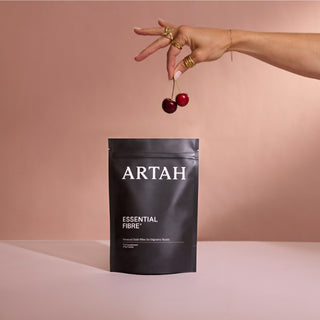The Dietary Stressor That No One Is Telling You About
By now, you’re probably well aware that chronic stress – the kind that lingers as a result of work pressure, home, financial or other ongoing challenges – is not good for us. It doesn’t just take a toll on our mental wellbeing, contributing to anxiety and overwhelm, but also manifests physically through digestive issues, a weakened immune system, fatigue and a higher risk of conditions like heart disease and high blood pressure.
But here’s something less commonly discussed: there’s a dietary stressor many of us consume daily that can be just as disruptive to both body and mind: Sugar. Specifically, refined sugar that’s added into foods, rather than naturally there. It can trigger the body’s stress response, interfering with a number of key systems. By understanding how sugar affects us, we can start to rethink our relationship with it, and take steps towards restoring equilibrium.
What happens when you eat sugar
Blood sugar spikes
When we consume foods that are high in sugar – think fizzy drinks, sweets, cakes, chocolate, fruit juice and even a number of breakfast cereals – our blood sugar levels surge. In response, the body releases insulin, a hormone that tells our cells to absorb glucose and use it for energy. But what goes up must come down: shortly after the surge, blood sugar levels drop sharply, resulting in a rollercoaster effect that can leave us feeling tired, irritable, low in mood and craving more sugar.
Blood sugar instability is one of the first ways sugar stresses the body. The more sugar we eat on a regular basis, the less sensitive our cells become to insulin, and the less efficient the body becomes at managing glucose. This is when insulin resistance and persistently elevated blood sugar levels occur – and the risk of metabolic issues, including PCOS, type 2 diabetes and obesity rises exponentially.
Cortisol levels rise
Research also shows that consuming sugar can trigger an increase in the stress hormone cortisol – especially after the inevitable blood sugar crash that follows a spike. (1) When blood sugar levels fluctuate a lot, cortisol can remain high for extended periods of time, which can cause weight gain (particularly around the waistline), low mood, sleep disruption and insulin resistance. Not to mention that the more stressed we feel, the more likely we are to eat unhealthy, sugar-rich comfort foods, creating a vicious cycle that can be tricky to break. (2)
Inflammation
Excessive sugar intake is also closely linked with systemic inflammation and oxidative stress, which can in turn lead to a number of disorders, including psoriasis, Alzheimer’s, inflammatory bowel disease, multiple sclerosis, cancer and more. (3)
This happens because blood sugar spikes place oxidative stress on our cells, which in turn triggers an inflammatory response and can cause increased intestinal permeability (also known as leaky gut), allowing inflammatory compounds to enter the bloodstream and spread throughout the body.
Poor mental health
The more sugar we eat, the more likely we are to experience poor mental health. Why? Because of increased inflammation, which interferes with the production of key neurotransmitters, like serotonin and dopamine – often referred to as our “happy hormones”.
When we eat sugar, the brain releases dopamine, which makes us temporarily feel good. But with frequent sugar consumption, the brain can become desensitised to this reward signal, making it harder to experience pleasure without it – a pattern that also occurs in addiction.
In fact, one study found that men who ate the highest amount of sugar were 23 per cent more likely to experience mental health issues, like depression, within five years. (4)
What to eat instead
First thing’s first: try and avoid sugar where possible. Not all sugar is easy to spot – much of it lurks on lengthy ingredient lists under less obvious names. For example, high fructose corn syrup, fructose syrup, agave syrup or nectar, lactose, dextrose, fruit juice concentrate and blackstrap molasses are all other names for added sugar, so make sure to be scrupulous about what’s in pre-prepared food – even those marketed as “healthy”. Fizzy drinks are some of the worst offenders, so avoid them as much as possible.
Focus on eating a balanced meal with plenty of protein (20-30g per meal), fibre, healthy fats, vegetables and whole grains to stave off sugar cravings, while fermented foods – such as kimchi, sauerkraut and yoghurt – have also been shown to promote a balanced gut microbiome and fend off mental health issues. (5) Fasting can also help reduce cortisol response, which can in turn help with sugar cravings, so practice time-restricted eating (between eight and 12 hours) overnight. (6)
When you do want something sweet to eat, swap refined and added sugar for fruit – including berries, nectaries, melon and others. When you consume sugar in this way, you also enjoy the fibre, vitamins, minerals, polyphenols and more that accompany your chosen piece of fruit, which slows down the absorption of fructose, helping to prevent those drastic spikes and drops, while also adding beneficial nutrients too.
References:
-
Sandra Zänkert, Brigitte M. Kudielka, Stefan Wüst, Effect of sugar administration on cortisol responses to acute psychosocial stress, Psychoneuroendocrinology, Volume 115, 2020, 104607, ISSN 0306-4530, https://doi.org/10.1016/j.psyneuen.2020.104607.
-
Janet Tomiyama, A., Finch, L.E. and Cummings, J.R. (2015). Did That Brownie Do Its Job? Stress, Eating, and the Biobehavioral Effects of Comfort Food. In Emerging Trends in the Social and Behavioral Sciences (eds R.A. Scott and S.M. Kosslyn). https://doi.org/10.1002/9781118900772.etrds0324
-
Ma X, Nan F, Liang H, Shu P, Fan X, Song X, Hou Y, Zhang D. Excessive intake of sugar: An accomplice of inflammation. Front Immunol. 2022 Aug 31;13:988481. doi: 10.3389/fimmu.2022.988481. PMID: 36119103; PMCID: PMC9471313.
-
Knüppel A, Shipley MJ, Llewellyn CH, Brunner EJ. Sugar intake from sweet food and beverages, common mental disorder and depression: prospective findings from the Whitehall II study. Sci Rep. 2017 Jul 27;7(1):6287. doi: 10.1038/s41598-017-05649-7. PMID: 28751637; PMCID: PMC5532289.
-
Leeuwendaal NK, Stanton C, O'Toole PW, Beresford TP. Fermented Foods, Health and the Gut Microbiome. Nutrients. 2022 Apr 6;14(7):1527. doi: 10.3390/nu14071527. PMID: 35406140; PMCID: PMC9003261.
-
Bernadette von Dawans, Patrick Zimmer, Gregor Domes, Effects of glucose intake on stress reactivity in young, healthy men, Psychoneuroendocrinology,Volume 126,2021,105062,ISSN 0306-4530,https://doi.org/10.1016/j.psyneuen.2020.105062.
Disclaimer: The information presented in this article is for educational purposes only and is not intended to diagnose, prevent, or treat any medical or psychological conditions. The information is not intended as medical advice, nor should it replace the advice from a doctor or qualified healthcare professional. Please do not stop, adjust, or modify your dose of any prescribed medications without the direct supervision of your healthcare practitioner.


















































